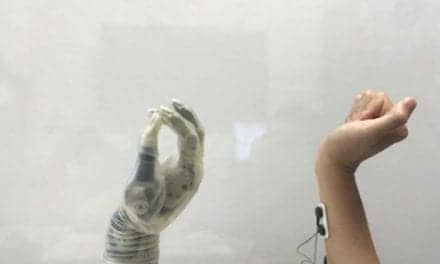Surgeons at Ronald Reagan UCLA Medical Center, Los Angeles, recently performed the first hand transplant in the western United States in a 14-and-a-half hours operation.
The transplant was performed on a 26-year-old mother from Northern California who lost her right hand in a traffic accident nearly 5 years ago. UCLA is only the fourth center in the nation to offer this procedure, and the first west of the Rockies. This was the 13th hand transplant surgery performed in the United States.
A team of 17 surgeons, anesthesiologists, operating room nurses, and technicians were involved in the effort to graft the hand onto the patient. The operation began with two surgical teams working simultaneously to prepare the donor graft and the recipient. Some four-and-a-half hours after the operation began, the donor limb was joined to the recipient. The surgeons then began the complex work of attaching tendons, blood vessels, and nerves to complete the surgery.
Following the surgery, the patient was brought back to her room, where she was met by family members. She will begin extensive physical rehabilitation and a regimen of immunosuppressant medication to help prevent her body from rejecting the new appendage.
The transplant was made possible by the generosity of the family of a deceased donor in San Diego. The donor’s family worked with the staff at Lifesharing, a division of UC San Diego Medical Center.
The transplant surgery is part of a clinical trial at UCLA intended to confirm that surgical techniques already established in hand transplantation are successful. The trial also aims to study the return of function in transplanted hands and to assess the effectiveness and safety of a less toxic anti-rejection medication protocol.
The transplant team will closely monitor the patient’s progress and how well her body adjusts to the new hand. As part of this, physicians will map her brain at key points in her recovery, observing which parts light up when she is asked to move her fingers or other parts of the new hand.
The UCLA Hand Transplant Program is aimed at helping those who have suffered the traumatic loss of a hand or forearm, allowing them to regain function and improve their quality of life. It is a partnership between UCLA’s transplantation services and its hand surgery, plastic and reconstructive surgery, orthopaedic surgery, psychiatry, pathology, anesthesia, internal medicine, radiology, neurology, ethics, and rehabilitation services.
Eligibility criteria for the hand transplantation study include:
• The patient must be between 18 and 60 years of age.
• The amputation must have been at the wrist or at the forearm level.
• The patient must have no serious infections, including hepatitis B or C, or HIV.
• The amputation was not due to a birth defect or cancer.
• The patient is otherwise in good general health.
• The patient will commit to extensive rehabilitation, will adhere to an immunosuppressant medication regimen, and will participate in follow-ups with the transplant center.
Lifesharing is one of four federally designated organ recovery organizations serving the state of California. Collectively known as Donate Life California, these nonprofit organizations administer the state’s official pink dot Donate Life California Registry. As of early March 2011, more than 8 million Californians had signed up at the Department of Motor Vehicles or online to be organ and tissue donors after they are deceased. The Donate Life California Registry is now the largest in nation, which is critical because California has the largest number of people on the US waiting list.
[Source: University of California, Los Angeles (UCLA), Health Sciences]




